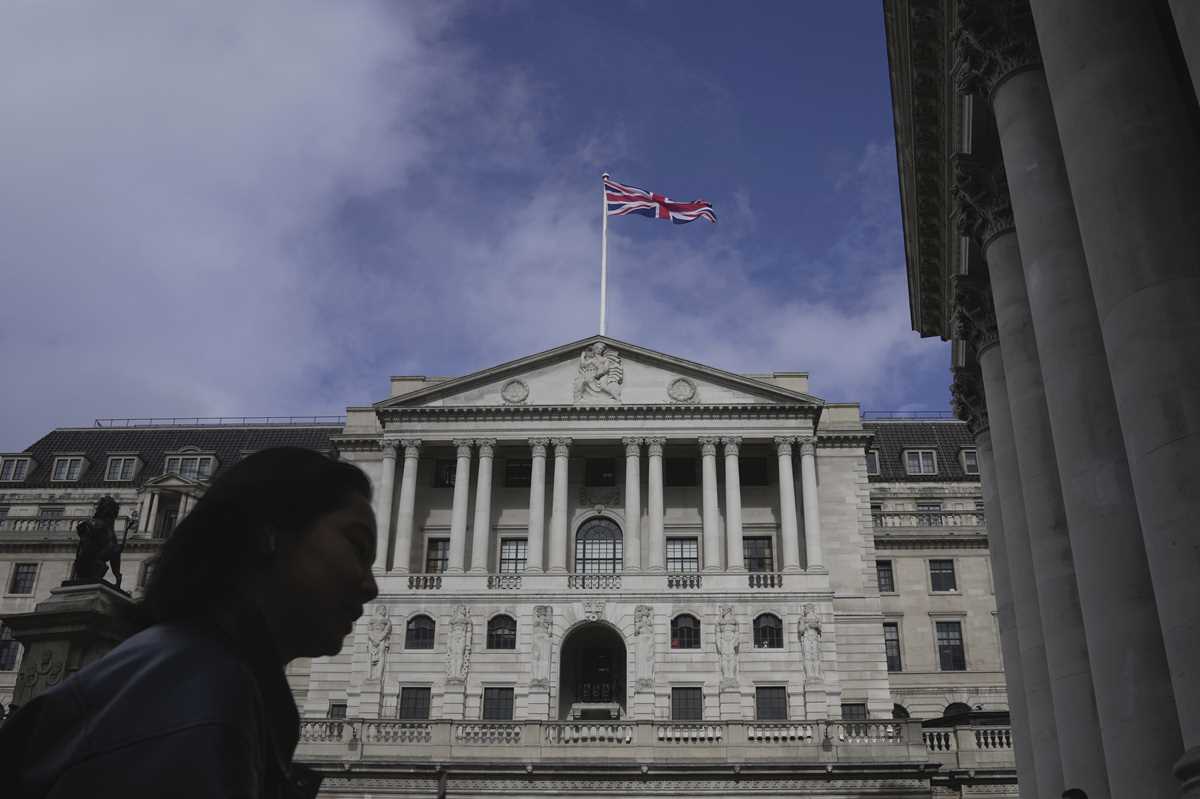 A woman walks in front of the Bank of England, at the financial district in London, on March 23, 2023. The Bank of England is widely expected to indicate Thursday March 21, 2024 that interest rates could be cut in the coming months following news that inflation across the U.K. is falling faster than expected. (AP Photo/Kin Cheung, File)
A woman walks in front of the Bank of England, at the financial district in London, on March 23, 2023. The Bank of England is widely expected to indicate Thursday March 21, 2024 that interest rates could be cut in the coming months following news that inflation across the U.K. is falling faster than expected. (AP Photo/Kin Cheung, File)LONDON (AP) — The Bank of England kept its main interest rate unchanged at a 16-year high on Thursday and avoided signaling, unlike other central banks, when it might start to cut even though inflation has dropped sharply from multidecade peaks.
The decision to leave the key rate at 5.25% was widely anticipated in financial markets and comes a day after the U.S. Federal Reserve also kept its benchmark rate steady. But unlike the Fed, the Bank of England gave few explicit indications that it was getting ready for a series of interest rate reductions soon.
The Swiss National Bank went the other way by becoming the world's first major central bank to cut rates in the current cycle, with its surprise quarter-point reduction Thursday.
In the U.K., market expectations that lower interest rates were on the horizon got a boost this week with news that inflation fell to a 2.5-year low of 3.4% in February — more than anticipated — and is now not far off the Bank of England’s target rate of 2%.
Bank Gov. Andrew Bailey said there have been “further encouraging signs” that inflation is coming down but that more evidence was needed “to be sure” that inflation will fall to his goal and stay there.
“We’re not yet at the point where we can cut interest rates, but things are moving in the right direction,” he said.
The bank's rate-setting Monetary Policy Committee acknowledged that inflation has been trending lower and could fall below the 2% target in the second quarter of the year.
One rate-setter voted for a quarter-point reduction, while the others backed no change, including two who had voted for a hike last month. That change shows the bank is slanting toward easing the costs to borrow to buy homes or cars or invest in businesses.
“With wage growth still elevated and underlying inflation pressures likely to pull inflation higher again in the second half of the year, we think we are still a few months away from the first rate cut," said Luke Bartholomew, senior economist at asset management firm abrdn. "However, once cuts start, ongoing economic weakness could see rates fall quite materially over the next few years.”
Central banks around the world raised interest rates aggressively in late 2021 from near zero to counter price rises first stoked by supply chain issues during the coronavirus pandemic and then by Russia’s invasion of Ukraine, which pushed up food and energy costs.
The U.K. saw inflation rise by more than other developed economies, with many analysts blaming the Bank of England for being too slow in starting to raise rates.
Higher interest rates — which cool the economy by making it more expensive to borrow, thereby bearing down on spending — have contributed to easing inflation worldwide, though they also have affected economic activity.
The British economy has barely expanded over the past year, unlike the U.S., and growth this year is expected to be fairly muted.
Carsten Jung, senior economist at the Institute for Public Policy Research, said the bank needs to cut interest rates soon because inflation is falling faster than expected.
Jung said the bank “tightened the screws too much, which is squeezing much needed future growth.”
Britain’s governing Conservative Party hopes that lower inflation and the ensuing decline in interest rates may trigger a feel-good factor ahead of a general election that has to take place by January 2025.
Opinion polls show the main opposition Labour Party way ahead and on track for a big victory over the Conservatives, who have been in power since 2010.
Most speculation is that Prime Minister Rishi Sunak will call an election in the fall, when the economic backdrop is likely to be more benign than it is now.
Before you make your next trade, you'll want to hear this.
MarketBeat keeps track of Wall Street's top-rated and best performing research analysts and the stocks they recommend to their clients on a daily basis.
Our team has identified the five stocks that top analysts are quietly whispering to their clients to buy now before the broader market catches on... and none of the big name stocks were on the list.
They believe these five stocks are the five best companies for investors to buy now...
See The Five Stocks Here
Which stocks are likely to thrive in today's challenging market? Click the link below and we'll send you MarketBeat's list of ten stocks that will drive in any economic environment.
Get This Free Report